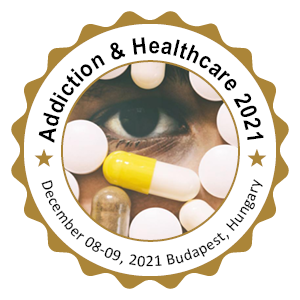Call for Abstract
Scientific Program
12th International Conference on Addiction, Psychiatry, Health Care and Drug Policy, will be organized around the theme “Resilience in Recovery from Addiction and Mental Illness”
Addiction is comprised of keynote and speakers sessions on latest cutting edge research designed to offer comprehensive global discussions that address current issues in Addiction
Submit your abstract to any of the mentioned tracks.
Register now for the conference by choosing an appropriate package suitable to you.
Psychiatric mental state Nursing uses a balanced nursing-medical approach to hide the foremost common disorders and coverings. It provides important information for approaching the foremost acquainted disorders mental state nurses and students can see in clinical observe, alongside useful suggestions regarding what the mental state nurse will say and do to move effectively with patients and their families. The PMH nurse develops nursing diagnosing and set up of care, implements the nursing method, and evaluates it for effectiveness. Medical specialty mental state Advanced observes Registered Nurses supply medical care services to the psychiatric-mental health people. These include schizophrenic disorder, schizoaffective disorder, and mood, anxiety disorders, temperament disorders, consumption disorders, self-destructive thoughts, psychosis, paranoia, and self-harm.
Neuropsychiatry is a branch of medicine that deals with mental disorders which are disorders caused to the nervous system. It precedes the disciplines of psychiatric and neuroscience, which has a common training, however, psychiatry and neurology subsequently split apart and these are typically practiced separately. A neuropsychiatric is a psychiatrist who is a specialist in the diagnosis and treatment of the disorders affecting the brain which cause a change in behavioral, psychological, and psychiatric symptoms, psychiatry is defined as the mental health of a person.
Behavioral addiction is a type of addiction that involves a compulsion to engage in a rewarding non-substance-related behavior – sometimes called a natural reward despite any negative consequences to the person's physical, mental, social, or financial well-being. Addiction commonly refers to substance abuse; however, the term connotation has been expanded to include behaviors that may lead to a reward (e.g., gambling, eating, or shopping) since the 1990s. A gene transcription factor known as ΔFosB has been identified as a compulsory common factor involved in both behavioral and drug addictions, which are associated with the same set of neural adaptations in the reward system.
Conventional Approaches for Addiction like Yoga, Meditation, and other Natural Therapy are the most common and popular recovery techniques used to treat individuals suffering from addiction and help them to prevent relapse. Yoga can act as regulating and balancing some of the stress hormones like cortisol, adrenaline and may help to balance parts of the brain and body that are impacted by drug abuse in a natural way. Meditation helps in reducing stress, anxiety, depression, and pain, as well as increases peace, perception, self-concept, and well-being. These Traditional approaches like Yoga, Ayurveda, and other Natural Therapy reduce withdrawal symptoms and drug craving. Many studies have discovered the effect of yoga and meditation on the fight-or-flight response which may explain why it has been linked to improved immunity. Scientific studies have given evidence that these approaches reduce stress by modulation of the stress response.
Neuropsychology is related to the applied science of brain-behavior relationships. This area incorporates principles of assessment and intervention based upon the scientific research of human behavior and abnormal functioning of the central nervous system. Neurodegenerative diseases are incurable and paralyzing conditions that result in progressive degeneration and/or death of nerve cells. This generates problems with movement (called ataxias), or mental functioning (called dementias). Assessment includes neuropsychological tests, patient history, qualitative observation, neuroimaging, Bender Visual Motor Gestalt (BVMG) Test, and diagnostic procedures.
Personality is defined as the set of behaviors, perceptions, and emotional patterns that evolve from biological and environmental factors. A personality disorder is nothing but a way of thinking, and behaving that differs from the expectations of the culture causes distress, and lasts over time. This causes significant problems and constraints in relationships, social activities, work, and school. An individual’s personality is influenced by experiences, circumstances (surroundings, life situations), and inherited characteristics.
Addiction is a heightened elevation of psychological dependence on both materialistic and non-materialistic charisma. It is a state of mind wherein neurochemicals have reached sufficient alteration. The time and material involved in addiction is variant of age, willpower, and health. Not all addictive products are illegal; addiction can hook on from alcohol to caffeine. Every time the reward pathway in the brain is triggered, addiction plays down the tune of harmony. Substance abuse can tear out physical wellbeing and Behavioral addiction can trick out of mental and social wellbeing. The craving for a particular aspect is where addiction becomes neurocognitive.

